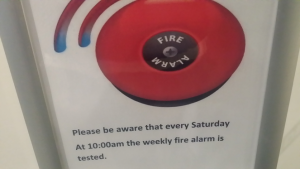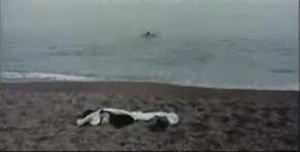Rather off topic, this, but it was an interesting thread – and links in a way to Clive Doig’s English plurals. Please see “Octupi is Wrong – Rules of the Plural Form in English” by Clive B Doig.
Pedants? Us?
This tread came about as a result of discussion about a painfully ungrammatical sign at TC:
(Click on the picture below to see a larger or clearer version of this picture:
Click the “X” button (top right) to close the newly opened picture.)

Why the word ‘weekly’ in the sentence, why the capital ‘a’ in ‘at’, why “:00” after the 10 (as it says “am”)?
The notice has possibly been done in Microsoft Word – putting in a return for a newline will automatically make the first letter UPPER case.
Photo by Gary Critcher, additional reporting by John Howell, Dave Buckley,
Mike Jordan
The lifts at Earls Court Piccadilly Line station proudly announce via the screen above the lift “This lift SHALL be the next to arrive” (my capitals)So who is ordering it around and saying it SHALL be so rather than it possibly WILL be so?Incidentally for all you tube buffs, have a trip up and down in the new lifts at Gloucester Road station. They haven’t covered up the staff emergency window in the side and one can see all the “works” looking lovely and new in yellow and blue. But no sign of the disused couple of shafts alongside which go up into a shop!
Keith Wicks
There are many rules concerning the use of “shall” and “will”. Factors such as person, period, country, intention, emphasis and obligation may determine which form is regarded as correct. In general, one can use either without causing confusion.
“This lift SHALL be the next to arrive.” This is an example of the form generally preferred in the formal English used in laws, rules and regulations. The appearance of this or a similar sentence was discussed at length in some newspapers – (2014, I think). The reason given by the transport authority was reported to be that experts had advised that “shall” is preferred in connection with technology. However, I think it is just because most displayed notices connected with transport technology use formal English.
As a former editor of English texts, I’d prefer “will” in the sentence under discussion and hope for change. However, I expect “shall” will persist for a long time. For it was only at railway stations that I ever saw the word “shewn” used – on a notice: “All tickets must be shewn.” Just why they persisted with this archaic usage for so long is puzzling. Perhaps it was just that the signs lasted a very long time!
Alec Bray
The Great Western Railway always used “shewn” and the Great Western Society still continues this usage. You will see “shewn” for example at Didcot Railway Centre.
In my last years at work I worked for Telelogic – and we were in the Requirements Management business (amongst other things). In Requirements Management, “SHALL” in the 3rd person means a mandatory requirement. ( “The software SHALL respond to a user keypress within one second.” ) .
In the training for the requirements management product (“DOORS”) we used this example:
“I shall drown and no one will save me”
means: I was swimming around, got out of my depth and there is no one around who can save me…
“I will drown and no one shall save me”
means: I have marched into the water determined to commit suicide and let no one dare to come to stop me…
The first example is a statement of a future event and the second one a statement of intention (and mandated operation).
As Keith says though, various things determine use. As a Swedish company headquartered in the USA I had to use the Chicago Manual of Style (ed 14).
As an aside, when the bidding was being done for the two Aircraft Carriers many years back, everyone thought that the contract would go to BAE Systems (no question), However, under the EU bidding rules, Thales thought they would have a go. Thales used our Requirements Management tools (and one of our consultants) to manage their response to the Invitation to Tender – and their submission was far and way superior to BAE systems. Now the Gov was in a quandary – they could not politically let the contract to a French company! So a fudge was created whereby both Thales and BAE got the job.
Keith Wicks
I fell in love with that manual (Chicago Manual of Style ) circa 1970, when producing an encyclopaedia for the US market.
In the late ’90s, I was told that New Yorkers didn’t much care for the Chicago book, one criticism being “too many hyphens.” There seemed to be a NY-Chicago rivalry, rather like that between Melbourne and Sydney.
Personally, I prefer the Chicago style.




